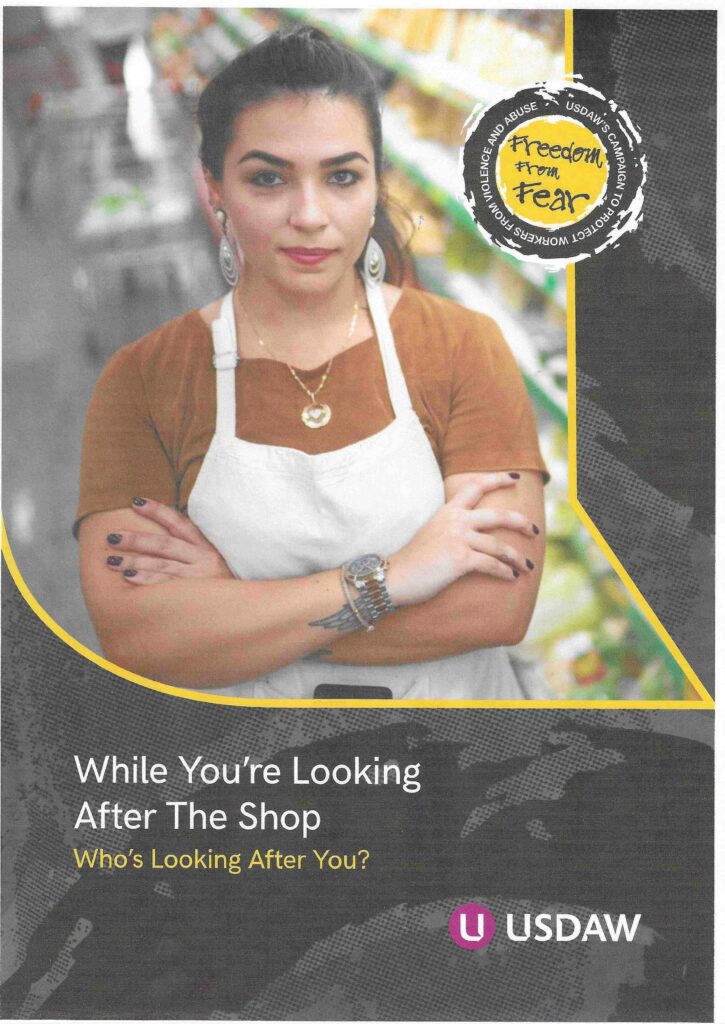 Meet The Shoplifters, by Stacey Dooley
Meet The Shoplifters, by Stacey DooleyReviewed by Joe Langabeer
Stacey Dooley, a journalist known for creating documentaries about humanity and societal affairs for the BBC, has recently launched a new series called Meet the…., which can be viewed on BBC iPlayer here. The first episode focused on traveller communities, with the second episode turning its attention to shoplifting. The episode explores the systemic rise in shoplifting across the UK, with more and more people regularly stealing from either supermarkets or their local shops.
Whilst the programme attempts to take a neutral stance—balancing the perspectives of those who are shoplifting with the shop staff affected by it—it’s clear from the interviews that most of those stealing is doing so out of desperation, with little support from the government to lift them out of such circumstances.
According to data from the British Retail Consortium, as reported by the BBC, customer theft incidents reported by retailers rose from 3.7 million in 2023 to 20.4 million in 2024—a staggering 16 million increase. The ONS has published separate statistics, showing a 29% increase in shoplifting incidents reported to the police. As discussed in the programme, and echoed in numerous headline articles over the past couple of years, it is being described as an “epidemic”. Indeed, I’ve heard the BRC on the Today programme on Radio 4 repeatedly urging the Labour government to crack down harder on shoplifters.
And they are. Whilst Labour recently announced cuts to benefits—measures that will undoubtedly push more people into poverty and desperation—they are also introducing a new crime bill targeting individuals who steal goods worth less than £200. This reverses 2014 legislation introduced by the Tories, under which shoplifting was treated as a less serious offence, and therefore attracted lighter punishment.
Low value goods now being targeted
The show addresses these statistics and the proposed bill from the outset, before Dooley goes on to observe and interview staff at a beauty shop who regularly deal with incidents of shoplifting. They describe how the job has changed over the time they’ve worked in retail—from what you might characterise as “regular shoplifters”, known to security, to it now being anyone. Much of what is being stolen isn’t expensive: lipsticks and toothbrushes are common.
The manager of the shop tells Dooley that, with the rise in shoplifting, retail staff are working harder than ever, yet still receiving no wage increases—leaving them demoralised. She argues that because of the rise in shoplifting, companies are making less profit, which means staff can’t be paid more. But that simply isn’t supported by the data.
Take the example of John Lewis and Waitrose. They’ve been among the leading retailers pushing for action on shoplifting, including trialling locks on trolleys and smart shelves that detect changes in weight. In a piece for the Financial Times in June 2024, Lucy Brown, Director of Central Operations at John Lewis, argued that people weren’t stealing out of need caused by the cost-of-living crisis, but out of “greed”—claiming offenders live “chaotic lives” and are feeding addictions.
Leading retailers see boost in profits
Whether it’s due to these anti-shoplifting measures or other factors, the company has seen a boost in profits for the 2024/25 period. Did that mean staff received their famous annual bonus—part of the John Lewis Partnership’s history as an “employee-owned” business? No. Instead, the company announced it would invest the money back into the business and cover rising National Insurance contributions for staff, set to increase on 1st April. This comes even though JLP Chair, Sharon White, received a £1.12 million pay packet last year, with Chief Executive Nish Kankiwala earning £1.18 million in the same period.

Yes, it is a “greed and not need” scenario—just not in the way Brown described. It’s greed at the top, with the real needs of staff going unmet. At a time when abuse towards shop workers is rising sharply, you might expect better pay, better working conditions, and investment in security. But they’re not getting any of it.
Over half of young people OK with stealing from big retail chains
In the next part of the programme, Dooley interviews Chloe, a 22-year-old recent graduate. She is a regular shoplifter who steals beauty products, primarily targeting big retailers such as Primark. In her view, it is an act of political resistance—hurting companies she believes promote slave labour and are complicit in war crimes. Dooley notes that this kind of thinking is becoming more accepted among young people, citing a recent YouGov survey that found over half of young people think it’s acceptable to steal from major supermarkets or retailers.
I’m sympathetic to Chloe’s sense of political resistance, but it’s misguided. She’s right to highlight the shady practices of these companies—their use of slave labour, their funding of authoritarian regimes in foreign conflicts, and their exploitation of workers at home through poor pay and bad working conditions. But her actions are indicative of a broader issue facing young people today. With neither the Tory nor Labour governments offering meaningful solutions to the crisis affecting young people—and with socialist alternatives lacking visibility and power—young people are left disillusioned, funnelling their frustration into forms of resistance that may lead to trouble and could even turn reactionary over time.
Petty criminality cannot be the answer. The real path forward lies in becoming part of the Labour movement—using one’s voice and experience within a trade union and pushing those unions to make demands of the government. That should be the priority for young people right now.
But as it turns out, Chloe’s actions aren’t solely political. Later in the programme, it’s revealed that after finishing her degree, she struggled to find a job and had come out of university with massive debts that she needed to pay back. She’s received little support in her efforts to find employment and is now trapped in a vicious cycle: she needs to steal to survive, yet if she’s caught and prosecuted, it could permanently prevent her from getting a decent job.
Stealing to survive
Every case study in the programme reveals the same pattern: someone loses their job or suffers a major life setback, and this prevents them from securing further work—forcing them to steal in order to survive. For some, this becomes an act of resistance. For others, it’s about the “thrill” and gradually turns into an addiction. In all of these stories, none of the individuals were supported. Instead, they were punished by the state for losing their jobs in the first place.
In the final interview, Dooley meets Ellie, a 20-year-old mother living in emergency temporary accommodation and struggling with debt. It’s revealed that she had come out of an abusive relationship and became homeless with her child. She was unable to afford basic necessities and, out of desperation, began putting unpaid items in her pram—alongside items she would pay for, to avoid arousing suspicion from shop staff. Eventually, she was caught by a staff member. Ellie broke down, explaining that she couldn’t afford to feed her son. She found the experience of being caught degrading, but she knew she had to protect her child and ensure he was fed.
And, in a powerful moment defending her actions at the end of the interview, Ellie said: “If you were going to go a month on less than £600—and that’s got to pay for your gas, electric, toiletries, food, everything—it would be impossible, and they wouldn’t be able to afford it.”
With prices constantly rising—Ofgem greenlighting hikes to reassure the private sector it can maintain profit margins—alongside people living under the most unaffordable private rents in seven years (with around 30% of their income spent just to keep a roof over their heads), it’s no wonder people are turning to shoplifting. It is poverty and desperation driving them, and these people should be supported—not reprimanded.
Root causes of shoplifting not challenged
Whilst I thought the documentary was effective in showing the reality behind why people shoplift—with all of the cases rooted in desperation—it ultimately fails to offer a solution. It simply accepts that a society increasingly reliant on shoplifting is a problem, without addressing the root causes or challenging the fact that billionaire retail and supermarket bosses have made millions during the cost-of-living crisis. These bosses exploited the crisis by raising prices in line with inflation to keep their profits healthy. Shareholders received billions in buybacks, while workers were given pitiful pay rises and consumers only saw their weekly shop become more expensive.
Food and clothing are not luxuries—they are essentials. The programme made it clear that the majority of shoplifting incidents don’t involve luxury items, but bread, cheese, toothbrushes, and other basic necessities. Supermarket chains have become so petty about theft that they’ve started security-tagging cheese blocks to stop people from stealing them. But in truth, there’s only one group doing the real stealing from consumers and staff: the bosses at the top.
That said, shoplifting is not the answer. All it does is create class antagonisms between the worker and the consumer. The real solution is to bring supermarkets and major retailers (the Big Six—Tesco, Sainsbury’s, Asda, Aldi, Morrisons, and Lidl) into public ownership, where food is treated as a basic human need, not a luxury dependent on income. Supermarkets should be run on the basis of need for the consumer, with workers democratically managing the shops and ensuring everyone has access to essentials.
Unions representing supermarket workers—such as USDAW — should be putting forward these demands and fighting for a system where retail serves people, not profit.
main image from BBC
 Meet The Shoplifters, by Stacey Dooley - Reviewed by Joe Langabeer Stacey Dooley, a journalist known for creating documentaries about humanity and societal affairs for the BBC, has recently launched a new
Meet The Shoplifters, by Stacey Dooley - Reviewed by Joe Langabeer Stacey Dooley, a journalist known for creating documentaries about humanity and societal affairs for the BBC, has recently launched a new The truth about the ‘two-tier’ justice system - By Joe Langabeer Every couple of years, we see a phrase enter the pantheon of political discourse that is jumped on by both politicians and
The truth about the ‘two-tier’ justice system - By Joe Langabeer Every couple of years, we see a phrase enter the pantheon of political discourse that is jumped on by both politicians and Warning signs for Labour in Runcorn by-election - By Andy Ford, Warrington Trades Council On paper, the Runcorn and Helsby by-election should be a walk in the park for Labour. The Party holds
Warning signs for Labour in Runcorn by-election - By Andy Ford, Warrington Trades Council On paper, the Runcorn and Helsby by-election should be a walk in the park for Labour. The Party holds Editorial: trade unions must fight seriously against Labour austerity - There can be no argument after Rachel Reeves’ Spring budget statement, that the Starmer government has moved decisively in the direction of austerity, even if
Editorial: trade unions must fight seriously against Labour austerity - There can be no argument after Rachel Reeves’ Spring budget statement, that the Starmer government has moved decisively in the direction of austerity, even if UK: still Winter, no sign of Spring - By Michael Roberts The UK government’s Spring statement on spending was as expected – really awful. First, Chancellor Rachel Reeves had to accept that the
UK: still Winter, no sign of Spring - By Michael Roberts The UK government’s Spring statement on spending was as expected – really awful. First, Chancellor Rachel Reeves had to accept that the

